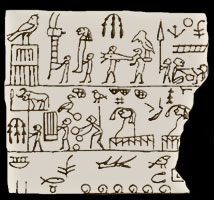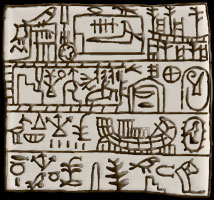
Djer (Hor Djer “Horus who succours”) ruled ancient Egypt during the first dynasty (Early Dynastic Period). Djer was probably Manetho’s “Athothis”. Manetho estimated that Djer’s reign lasted 31 to 39 years, but inscriptions on the Palermo stone suggest that he actually ruled for about 57 years. Manetho describes him as a scholar and claims that an anatomy textbook written by this ancient Egyptian king was still in use in Greek times.
Fragments of ivory labels from Abydos record trips to Sais and Buto, in the Delta of Lower (northern) Egypt. Unfortunately, the hieroglyphs are still at an early state of development making them difficult to translate.

His tomb at Abydos (tomb O) was one of the largest and most complex tombs of the First Dynasty. From the Middle Kingdom onward, it was thought that the tomb was the burial place of Osiris. Among the pilgrims to this shrine was King Khendjer, who provided a statue of Osiris for the shrine of the cult centre. Within the tomb, archaeologists discovered the earliest surviving royal jewellery, four gold and turquoise bracelets. The Pharaoh also built two large mastabas at Sakkara and a temple to Neith in Sais.

An inscription at Wadi Halfa records a military campaign deep into Nubia and there is evidence of a campaign into both Libya and the Sinai. He even went as far as naming one of his regnal years “The Year of Smiting the land of the Setjet” (Syria-Palestine). This made him the first Pharaoh to record military activity outside Egyptian borders.
Djer seems to have gained a reputation for being powerful and clever, but he also had a darker side. A wooden label was found at Saqqara bearing his name, alongside a ceremony connected with human sacrifice, and his tomb at Abydos is surrounded by the satellite burials of three hundred servants who were interred at the same time as the Pharaoh. This barbaric practice was soon abandoned.
Pharaoh’s Names
Manetho; Athothis (although some claim he was Kentekenes)

Nomen; Iti (recorded on the Abydos kings list
Copyright J Hill 2010